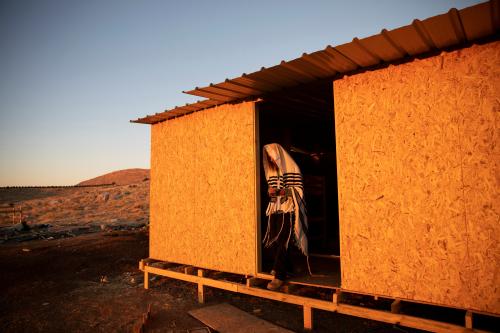Israel’s annexation of occupied West Bank territories is now looming, a move that U.N. Secretary-General António Guterres has said would be a “most serious violation of international law.” In fact, President Trump’s so-called Israeli-Palestinian peace plan proposed such a move. The Trump administration plan also purports to offer a Palestinian “state,” but the proposed entity hardly bears resemblance to states as we have known them: Palestinians would rule over about 70% of the occupied territories, in fragmented sections connected through passages, with no control over security, borders, air, territorial waters, or alliances with states. After reviewing Trump’s offer, 50 former European leaders described it as akin to apartheid. Not surprisingly, the Palestinians quickly dismissed it. This then opened the way for Trump to possibly back Israel’s unilateral implementation of aspects of the plan, including annexation, that could take place as early as the beginning of July.
How do Americans feel about the offer, and about possible Israeli annexation of West Bank territories?
To find out, we fielded a set of questions through the University of Maryland Critical Issues Poll. The poll was carried out by Nielsen Scarborough, among a nationally representative sample of 2,395 American adults, fielded March 12-20.
Notably, only 8% of respondents who were at least “somewhat familiar” with the plan — including 14% of Republicans — said that what the plan offers the Palestinians constitutes a “state” when presented with the description of the offer. Instead, a plurality of respondents, including majorities of Democrats and independents, describe what’s being offered as “occupation.”
The data
The poll began by asking respondents: “In early February, the Trump administration released its Middle East plan addressing the Israeli-Palestinian conflict. How familiar are you with this plan?” Not surprisingly, 34% said they were “not very familiar” and another 36% said they were “unfamiliar.” Four percent said they were “very familiar” with the plan, and 25% said they were “somewhat familiar” with it.
The following are key takeaways based on the opinions of respondents who said they are either “very familiar” or “somewhat familiar” with Trump’s plan.
First, without being given any information about the plan, the general impression of respondents who were at least “somewhat familiar” with it is more unfavorable than favorable, and far more viewed the plan as “too favorable toward Israel” than toward the Palestinians. As with almost every issue in the current American political environment, there was also a notable partisan divide.
A majority of all Democrats (71%) and independents (53%) had “unfavorable” opinions of the plan, compared to only 12% of Republicans. More than half of Republicans expressed a “favorable” opinion (54%), whereas only 5% of Democrats responded this way. Overall, fewer Americans found the plan “favorable” (29%) compared to the other options — 42% said it was “unfavorable,” 22% said it was “neither favorable nor unfavorable,” and 7% said they “don’t know.”
Only 10% said the plan is “too favorable toward the Palestinians,” with little variation across the partisan divide: 8% of Republicans, 9% of independents, and 11% of Democrats. In contrast, 42% say it’s “too favorable toward Israel,” including 72% of Democrats, 46% of independents, and 12% of Republicans. At the same time, 40% said it was “about the right balance,” including 71% of Republicans, 29% of independents, and 10% of Democrats.
Second, we presented the respondents with a brief description of the entity that Trump’s plan offered the Palestinians, then provided them with options to describe it:
The Trump plan envisions Palestinian control over about 70% of the West Bank and Gaza, which were occupied in the 1967 War, in addition to some territorial exchange. According to the plan, the Palestinian territories will be fragmented but connected through passages and Palestinians would have no control over territorial water, air, security, borders, and no right for alliances with other countries. In your opinion, what would you call an entity with those characteristics?
Respondents were presented with randomized options: “A state,” “occupied territories,” “autonomous region,” “one state but without equality,” and “don’t know.”
Only 8% of respondents would call what the entity Trump offered the Palestinians “a state,” including 3% each of Democrats and independents, and 14% of Republicans. A majority of both Democrats and independents would consider the entity “occupied territories” (53% for both), while a plurality of Republicans said they “don’t know” (34%).

Third, we presented a set of questions about proposed Israeli annexation of Israeli settlements in the West Bank. This issue highlights the partisan divide: A strong majority of Democrats (79%) oppose the proposed annexation of settlements, while more than half (56%) of Republicans support this, bolstered by strong support from evangelical Republicans (64%).

It is notable that this bottom-line question on annexation was preceded by a series of questions probing the principles on which respondents supported or opposed annexation. Two arguments were presented against annexation: one based on international law, and one based on Palestinian rights. Two arguments were presented in favor of annexation: one based on realities on the ground, one based on biblical claims. After testing support for each argument separately, we asked respondents which one was closer to their view. Respondents were divided down the middle, along partisan lines, with a majority of Democrats citing international law, a plurality of Republicans citing biblical claims, and independents leaning more toward the Democratic positions.

Finally, we repeated a question we have been asking for years about Israel’s Jewishness versus its democracy, which was asked of all respondents, not only those who were at least somewhat familiar with Trump’s plan: “Which of the following statements is closer to your view if a two-state solution to the Israeli-Palestinian conflict is not an option?” As in previous polls, nearly two thirds (63%) said: “I favor Israel’s democracy more than its Jewishness. I support a single democratic state in which Arabs and Jews are equal even if that means Israel would no longer be a politically Jewish state.” This includes 81% of Democrats and 70% of independents. Republicans were split, with a plurality (49%) saying: “I favor the Jewishness of Israel more than its democracy. I support the continuation of Israel’s Jewish majority in the government even if it means that Palestinians will not have citizenship and full rights.” It is notable, however, that non-evangelical Republicans favor democracy over Jewishness by 10 percentage points (51% compared to 41%).
What it could mean for the election
Needless to say, the American public has not followed Trump’s Middle East plan closely, with 70% of respondents saying that they are either “unfamiliar” or “not very familiar” with the plan. This also applies to evangelical Christians, who tend to support Israeli annexation more than other Americans. As one evangelical leader put it, the issue of Israeli annexation “would have great resonance with most evangelicals” under different circumstances, but given other issues dominating the national dialogue, there is little if any “interest or attention being paid” to annexation “by American evangelicals at the grassroots level.” Evangelicals at the grassroots are not driving Trump’s decision on this issue, and they are unlikely to base their support for Trump’s reelection on what he does on it.
The same could be said about the upcoming 2020 election more generally. It’s improbable that the Israeli-Palestinian conflict will play a major role, given everything else that Americans now face. The main story is to be found in the attitudes of Democrats. The strong opposition to annexation, and the pervasive sense that Trump’s plan is too favorable to Israel, adds to other recent findings suggesting a shift taking place — one that could be solidified by Israeli annexation of West Bank territories. In an October poll for example, we found that 66% of Democrats back sanctions or stronger measures against Israeli settlements; in a March poll, we found that 81% of Democrats say it’s “acceptable” or even the “duty” of members of Congress to question the U.S.-Israeli relationship. Recent Democratic primaries may point to the consequences: In New York’s 16th District, progressive candidate Jamaal Bowman apparently unseated long-time Congressman Elliot Engel, who has been one of the most reliable supporters of Israel in Congress. One remarkable thing about that race is that Bowman made an issue of Engel’s support for Israel and his lack of support for Palestinian rights. Polling suggests annexation will likely energize Democratic critics of Israel further.
The Brookings Institution is committed to quality, independence, and impact.
We are supported by a diverse array of funders. In line with our values and policies, each Brookings publication represents the sole views of its author(s).






Commentary
What Americans think about the looming Israeli annexation and Trump’s Middle East plan
June 29, 2020